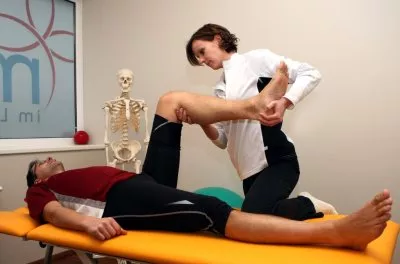Pain can be annoying, especially when it won’t go away.
 Have you ever struggled with an ache or pain that doesn’t heal? It is one thing to grit your teeth and get over a momentary blow, but when the same pain emerges over and over again, something needs to be done. Most of us can probably remember a time when we felt the wrath of aching joints and strained muscles. With such experiences, it is common to wonder, “How can I speed up the healing process?”
Have you ever struggled with an ache or pain that doesn’t heal? It is one thing to grit your teeth and get over a momentary blow, but when the same pain emerges over and over again, something needs to be done. Most of us can probably remember a time when we felt the wrath of aching joints and strained muscles. With such experiences, it is common to wonder, “How can I speed up the healing process?”
Physiotherapy helps speed up the healing process for a broad range of physical complaints. From feeling a strain in the shoulder, to recovering from ACL surgery, and even getting over the symptoms of concussion, physiotherapists are equipped to guide people through recovery processes that bring about quick, correct healing.
How does Physiotherapy Speed Up the Recovery Process?
Several people wonder how physiotherapy can aid the entire healing process. After all, healing is a multi-faceted concept. It involves the environments in which we live, our dedication to following prescribed regimens and remedies (whether physical or medicinal) and even our positive psyches. However, what most people don’t know is that, as the Chartered Society of Physiotherapy, UK, points out, “Physiotherapy is a science-based profession and takes a ‘whole person’ approach to health and well-being, which includes the patient’s general lifestyle.”
Different from general practitioners, physiotherapists are able to spend quality time with patients. Oftentimes, physiotherapy sessions can last upwards of one hour. Therefore, a certified professional is able to take time to listen to your complaints of pain and come up with unique solutions that can help you not only avoid pain, but strengthen your body so that it overcomes these pains entirely.
Case Studies in Achieving Quick Recovery through Physiotherapy
While some people and medical professionals see physiotherapy as a “last ditch effort,” others promote early intervention. In the medical journal Spine, a study notes the difference between people who receive physiotherapy two weeks after injury as opposed to those who waited 15-90 days. The individuals who received prompt care required less medical services for the next year and a half following physiotherapy treatment. Therefore, it seems that people who use physiotherapy at the first signs of pain have good chances at healing quickly and correctly.
Beyond physical healing, physiotherapy may help people recover faster after suffering concussions. A study conducted at the University of Calgary found that a striking difference exists between patients who receive cervical spine physiotherapy and patients who only receive vestibular rehabilitation. 73 per cent of participants who received physiotherapy were “medically cleared within eight weeks,” while only 7 per cent of those who received standard rehabilitation were cleared in that same time.
Physiotherapy can aid the recovery process for several conditions, even concussions. Connecting with a physiotherapist soon after injury occurs or pain appears may be the best way to accelerate healing. However, any time you have a pain that won’t go away, consider consulting with a physiotherapist. These professionals can give your whole body the attention it needs to foster quick, correct healing.
